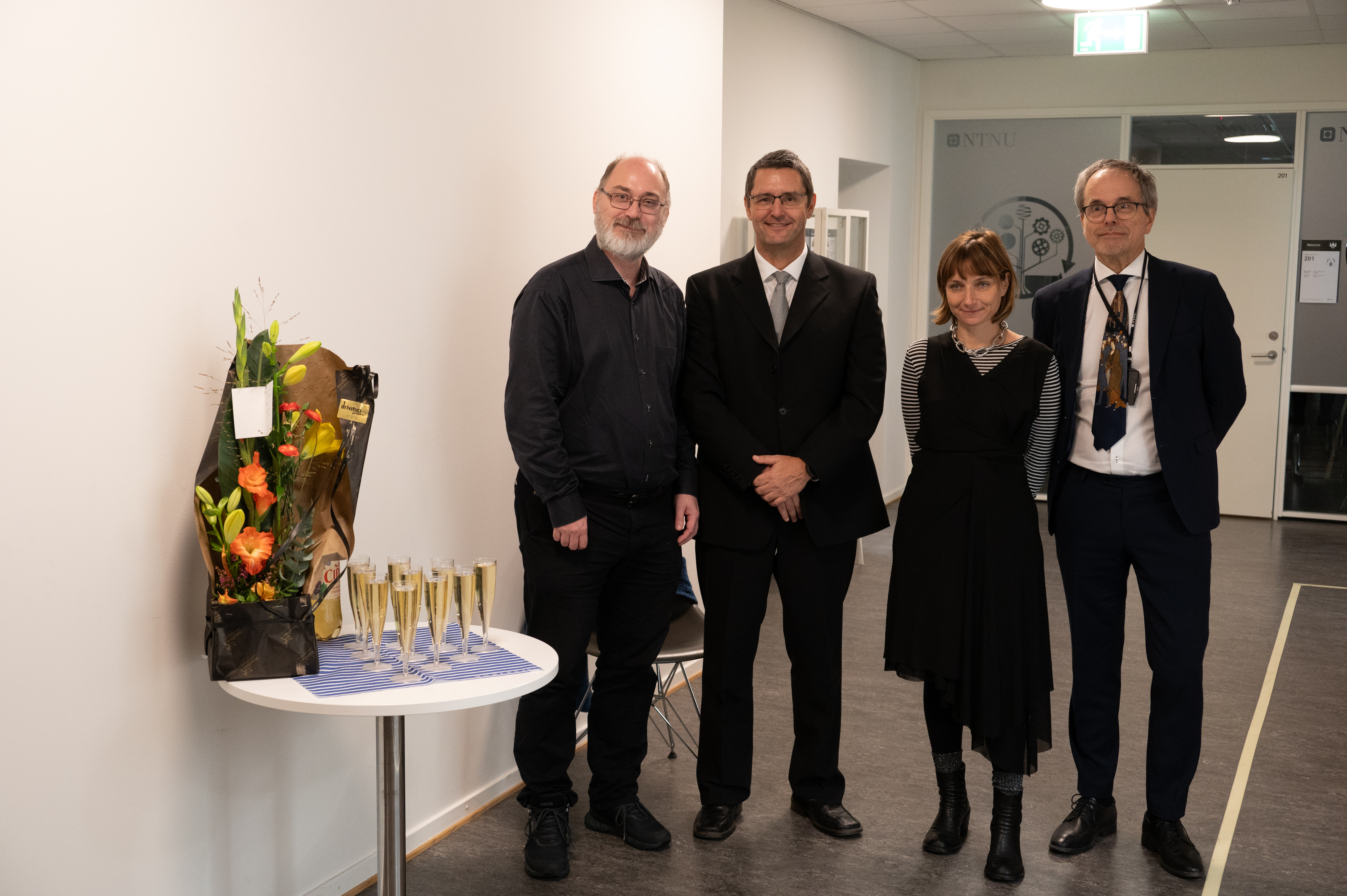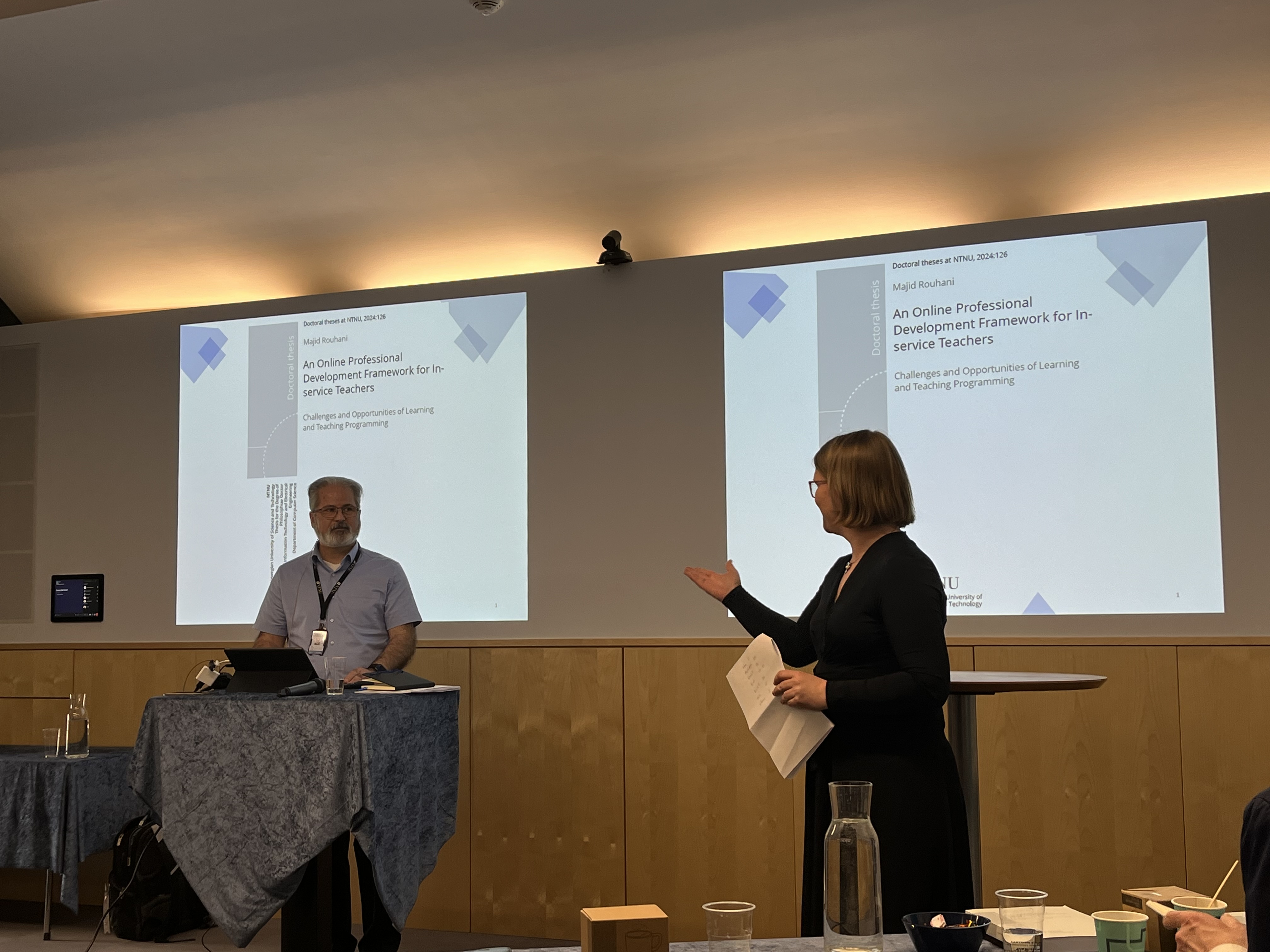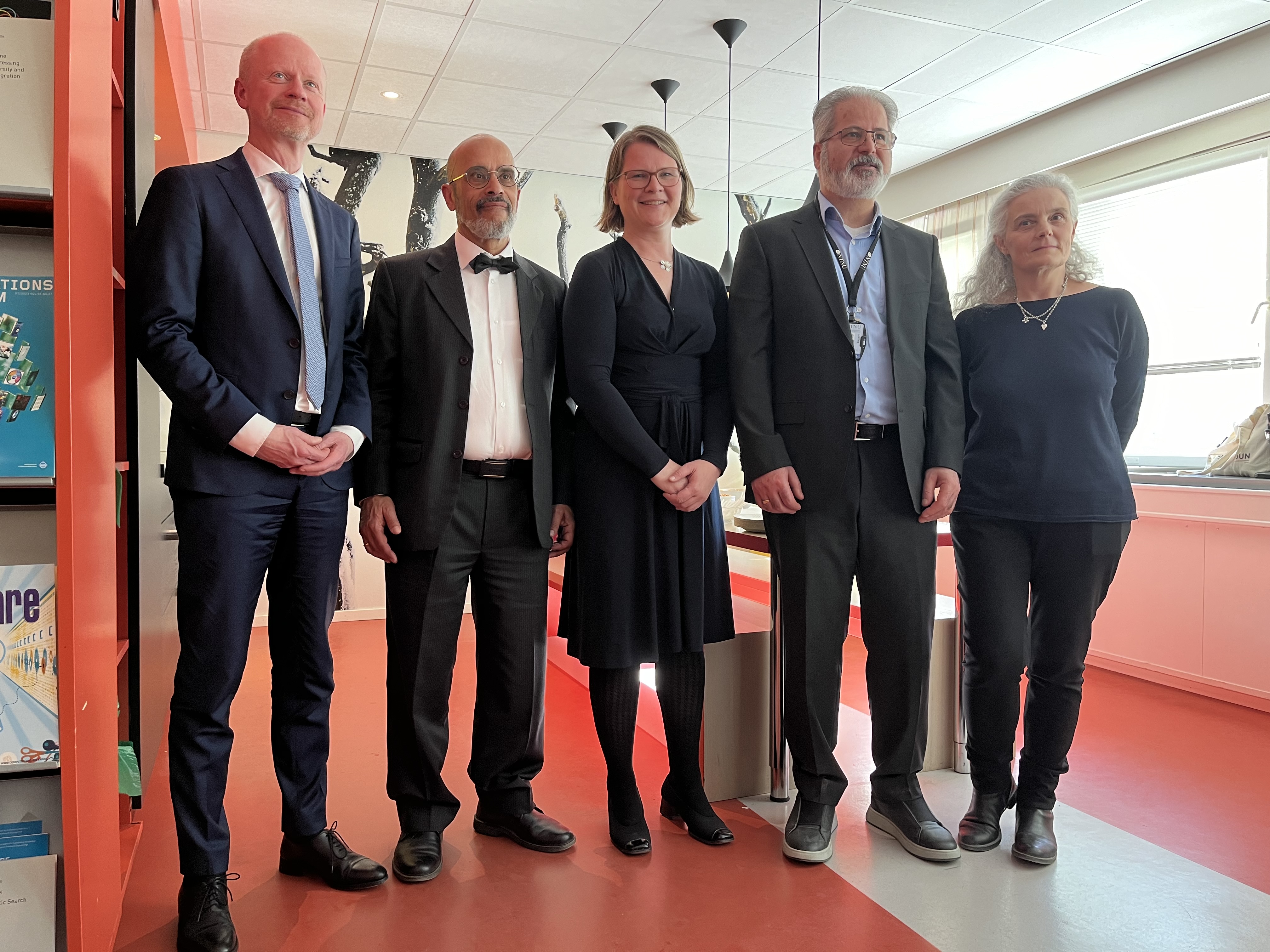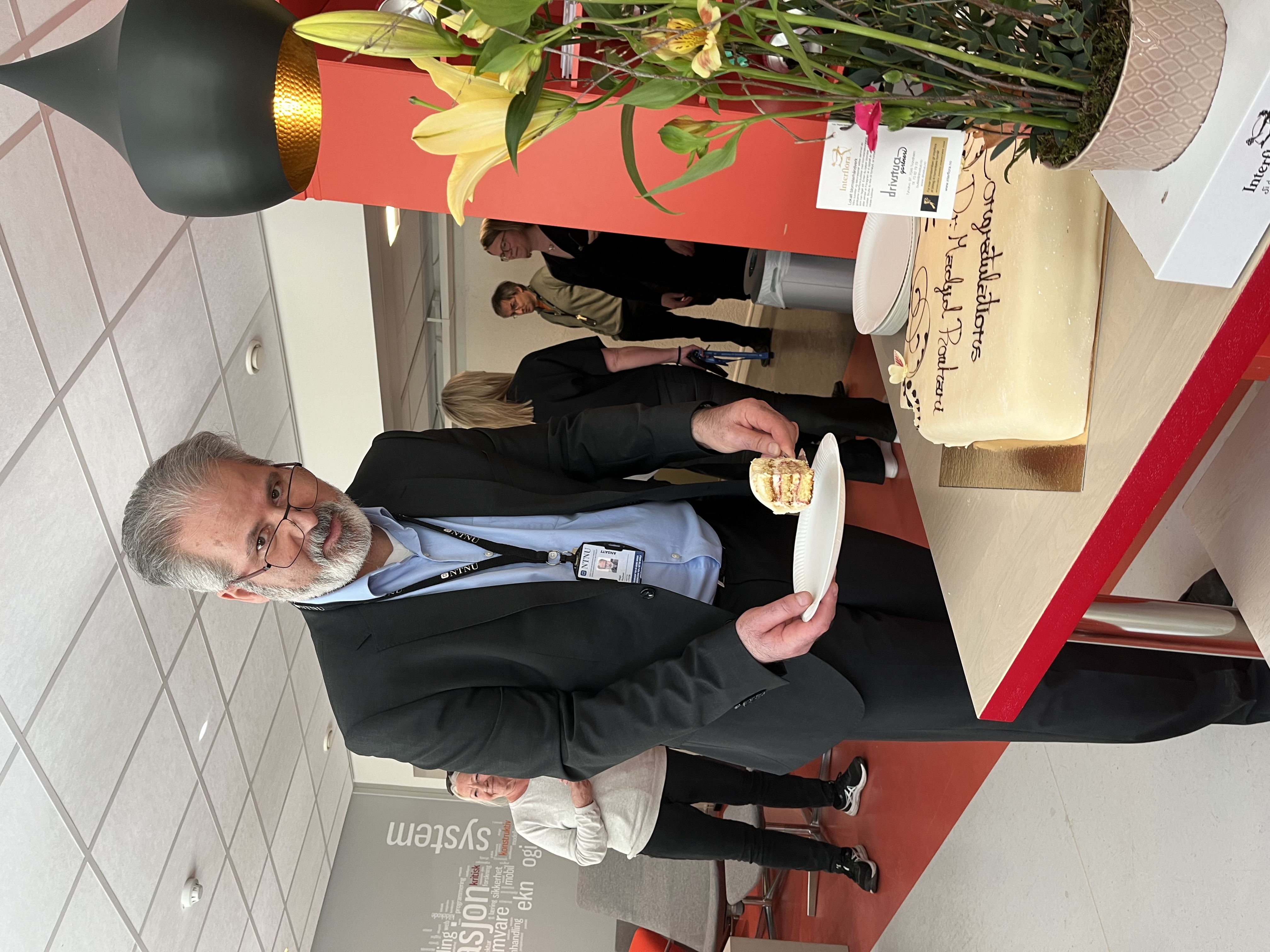News
News
Excited at EDUCON
Several NTNU/Excited-persons attended the IEEE EDUCON conference in London 22-25 April 2025, one of the primary international conferences for education-related research and experience exchange in electrical engineering and computer science. In total, seven different papers had co-authors somehow related to Excited. Ottar Osen and Robin Bye from NTNU Ålesund attended to present their paper Integrating Evaluative Judgement Into Engineering Education Assessment: A Practical Approach (also co-authored by Anders Ulstein). Ottar Osen also participated as a panelist in a plenary discussion in the Great Hall, on the topic Integrating Sustainability into Engineering Education Worldwide.

Photo 1: Centre-stage roundtable on sustainability, left to right: Ottar Osen (NTNU), Susan Lord (U. San Diego, USA), Fatima Z. A. Eddahab-Burke (TU Delft, Netherlands), Miri Barak (Technion, Israel), Lisa Bosman (Purdue U., USA)
Talha Mahboob Alam presented his paper Design and Evaluation of Novel Architecture for a Classroom Interaction Tool co-authored with Tomas Klungerbo Olsen, George Adrian Stoica, and Özlem Özgöbek. Talha also received one of two IEEE student awards, presented at the conference banquet.
Isabella Possaghi presented her paper Fun Until the Limits: Students' Perceptions of Design Thinking Projects With Digital Tools, co-authored with Feiran Zhang, Kshitij Sharma, and Sofia Papavlasopoulou. Eleni Chatzidaki presented her paper Gamification in Informal Science Education: Enhancing Children's Motivation and Engagement With VitenChallenge Application, co-authored with Elisabeth Phung Nguyen Doan, Emma Thoresen Kjelstrup, Sofia Papavlasopoulou, and Michail Giannakos. Guttorm Sindre presented his paper Mastery Learning in CS1 With High Transparency Tests: Challenges for Fairness Among Task Variants.

Photo2: Guttorm Sindre presenting his paper.
Bjørn Klefstad and Grethe Sandstrak (NTNU Trondheim) and Arne Styve (NTNU Ålesund) attended to present their paper Redesigning Computer Science Programs for Next Generation - Perceptions Versus Experiences (also co-authored by Kiran Raja from NTNU Gjøvik, the work thus spanning all three campuses, related to the cross-campus Bachelor Engineering degree). Arne Styve was also the co-author of another paper, Stimulating Critical Thinking in a Web Programming Module With Generative AI Tools, written together with Usman Naeem (Queen Mary University of London), and Outi Tuulia Virkki (Haaga-Helia University, Finland) – in addition to chairing two sessions at the conference.

Photo 3: Networking at the conference. From left to right: Frank Dieball (Hochschule Bonn-Rhein-Sieg, Germany), Guttorm Sindre, Outi Virkki (Finland), Irene Rothe (Bonn-Rhein-Sieg), Corinna Thomser (Bonn-Rhein-Sieg), Grethe Sandstrak, Bjørn Klefstad, and Arne Styve. Irene and Corinna have had a long-term collaboration with Grethe, and Outi is one of Arne’s co-authors.
CatchIDI 2025
- Written March 24, 2025 by Anna Holden Jacobsen/Excited
On March 17, Excited helped organize Catch IDI, a conference aimed at inspiring and motivating staff and students at the IDI faculty. Our task was to put together an academic program full of presentations on various research projects, master’s theses, and studies from the IT field here at NTNU in Trondheim. The talks covered topics such as the use of AI in nuclear medicine, the classification of right-wing extremism on social media, and why we should all be feminists in software development. The day was a great success, packed with exciting academic content, and we ended it with a lovely dinner and entertainment at the Radisson Blu Royal Garden. Thanks to everyone who contributed to making this year’s Catch IDI yet another successful conference!



Dissertation on Game-Based Learning
- Written 7.10.2024 by Guttorm Sindre
Trygve Pløhn defended his PhD on September 26, 2024, with the thesis Exploring Player Engagement in Social and Pervasive Learning Games. His main supervisor was Prof. Trond Aalberg, who is also the leader of Cluster 3 on Tools and Infrastructure at Excited. The opponents at the defense were Prof. Staffan Björk from the University of Gothenburg and Dr. Elisa Rubegni from Lancaster University. The internal committee member and administrator was Guttorm Sindre.

The topic of the thesis is pervasive games, i.e., games where you cannot simply sit in front of a screen or at a desk, but must move around in the environment (e.g., on campus or in the local area) to progress in the game. When such games are used in an educational context, it is common for students to play as part of a mandatory teaching program. A challenge often seen in such situations is the wide variation in students' motivation to participate in the game, and a key issue that Pløhn addresses is how to motivate students who were initially less motivated.

Links:
How ePortfolios can help students recognize their competencies

The research article Enabling computing students to recognize acquired competencies with ePortfolios, published in Computer Science Education, is now available online! The first author is Hege Annette Olstad, who in her PhD project has investigated students’ use of ePortfolios and in particular how ePortfolios can help students recognize the competencies they gain throughout their studies. Awareness of these competencies is closely linked to students’ learning, resulting from, as well as fueling, reflection. Also, awareness of one’s competencies helps students convey their knowledge and skills to employers and make well-founded career choices. The research presented in the article was funded through Excited Centre of Excellent IT Education.



Photo: Swetlana Fast/NTNU
Interview with Majid Rouhani: Defence on continuing education in programming for teachers
Written by Guttorm Sindre, 8 May 2024
On 3 May 2024 there was a defence for the degree Dr. Philos at IDI, NTNU, when professor Majid Rouhani defended his thesis with the title "An Online Professional Development Framework for In-service Teachers: Challenges and Opportunities of Learning and Teaching Programming".
The starting point for the thesis is research Rouhani has done at NTNU's continuing education offer in programming for teachers, an offer he himself has been central to the development of. The initiative for this continuing education offer was taken by Excited in 2017, when Trond Aalberg (then sub-project manager for Excited P2) ran a pilot for a continuing education course in programming for teachers. Based on this pilot, an application was submitted to Udir in early 2018 for support via the KOMPiS program to create an online offer of 15 credits, in the form of two courses: one in basic programming, and one in advanced applied programming. The subject teachers for these two subjects were Elise Vonstad and Majid Rouhani, who have put a lot of effort into further developing the scheme, and there are now several hundred teachers who take these subjects annually.
There are currently very many teachers in grades 8-13. stages that need to learn programming, as this has received increasing focus in Udir's framework plans, both as a subject in itself, and for application in, among other things, mathematics and physics. At the same time, the specific needs can vary widely from teacher to teacher. Some will teach programming as a subject in itself, while others will use it in the context of mathematics or other subjects. Some will program ordinary PCs, while others will program mini robots such as Arduino or Raspberry Pi. The key to the success of Rouhani's scheme is a course design that scales to a large number of course participants, but which at the same time provides enough flexibility for each teacher to specialize in the type of programming that is most useful for their teaching practice in school. This is achieved, among other things, with a significant element of project-based learning in the subject.
The thesis is not a result of the teaching itself, but of Rouhani's research on the effects of the teaching scheme, how it supports the course participants' opportunity for self-regulated learning and builds up during their further practice as teachers of and with programming in schools. It consists of 9 peer-reviewed articles published at international conferences. Monica Divitini from Excited has also been involved in the research and is a co-author on many of the articles. The committee that assessed the thesis was Prof. Said Hadjerrouit from UiA, Kristiansand, Prof. Erik Barendsen from Radboud University, the Netherlands and Birgit Krogstie as internal member and administrator. Both external opponents had thorough and interesting discussions with Rouhani during the defence, while the thesis was recognized as a very solid piece of work.
Question: How did you experience the dialogue with the opponents during the defence?
Answer: I think it was a nice and constructive discussion where the research and design methods were reflected upon. The feedback from the opponents was that the defence was engaging and demonstrated good knowledge in the field.
Question: Have you received a lot of feedback from teachers who have taken your course afterwards, for example about how the new skills have been useful for them in their own teaching at school?
Answer: Here I can e.g. refer to an interview we had with one of the participants who shows how programming has changed her teaching and how programming has increased the engagement of her students.
We have also carried out a study to precisely see the effect of the program on the teachers' practice in the classroom. The evaluation shows a very positive impact on the teachers' self-confidence and attitudes towards teaching programming. Several expressed that they could not teach programming before the courses, but that they now felt able to teach it in their subjects. Other teachers felt that they could have taught programming already before the courses, but expressed that they felt even more confident about it afterwards. In general, the teachers felt that the in-service training had a positive impact on their attitudes and helped them see the relevance and benefits of programming in teaching. Although the teachers perceived that their programming skills weakened over time when they were not actively using them, they still felt that they could refresh their skills quickly when needed. This suggests that the further education had a lasting effect on their self-esteem. Furthermore, the evaluation showed that teachers who had taught or used programming in their classes in the past year felt more competent to teach it, indicating that they were given a foundation on which to build.
An important point to take away is that the teacher's role is changing in response to the increasing emphasis on programming education. Programming is a demanding subject, especially for beginners, considering that there are several skills that must be used when using programming as an aid to solve problems in different subject areas. This attitude is important to take into the classroom. Becoming aware that the teachers must develop in step with the students when it comes to programming can influence their motivation in a positive direction.
Question: What is the role of a teacher in an online course that is laid out in a flexible way to take into account the different needs and interests of the course participants? Is it more demanding than "one-size-fits-all" teaching?
Answer: Surprisingly, this course is no more demanding than "one-size-fits-all", perhaps quite the opposite. We have developed a scheme where we use participants as resources/contributors to the programme. After all, they are both educators and experts in the subject areas in which they will apply programming. I myself have extensive experience from the industry and have gradually become much more aware of how important it is to understand the user and the problem area when creating a computer system. We know that many IT projects are not successful, and part of the reason may be precisely that you do not know the subject area you are building a system for well enough. This is also confirmed by my own experience of working with large IT systems.
Facilitating so that teachers can link programming closely to subject areas they know well is therefore an important success factor. They have a better starting point in succeeding in the integration and implementation of programming in their subjects than what IT experts would have been able to do. In addition, they possess pedagogical competence, which further contributes to success. For us as instructors in the programme, it is important to set up a scheme that encourages and engages teachers in learning programming. And we have largely succeeded in this through studying problem areas and opportunities that programming provides from the teachers' perspective.
Through a project, the teachers develop their own teaching plans which they can use in their classes immediately after they have finished the programme. This turns out to be a great motivation for them. They become independent, and through collaboration with other teachers they get to develop a teaching plan that they see the benefits of and have faith in.
They put in more effort to reach the goal. Almost all (more than 95%) of the participants complete the program, which is very high for online education.
We conduct regular webinars where we address various relevant topics that most people can benefit from. Teaching plans that have been developed by other teachers from previous years are made available as resources as a starting point for developing new and even more adapted plans. Teachers are also good at using each other to discuss and find answers to their problems. This makes the program scalable. It therefore does not require much more time from us instructors than a course of the "one-size-fits-all" type.
Question: Can similar flexible teaching arrangements with a strong focus on self-regulated learning also be relevant for regular campus-based studies?
Answer: The form of teaching we are currently implementing for teachers will not be directly transferable to campus-based studies with students coming straight from upper secondary schools. The scheme requires that the participants know the subject area in which they will apply programming. In contrast, I believe that generative AI (Artificial Intelligence) can pave the way for more self-regulated learning in normal campus-based studies.
Generative AI has entered teaching too fully, both for students and teachers. I think self-regulated learning is to a greater extent possible in campus-based studies now as a consequence of this. The students have the opportunity to self-learn the basic skills through the use of AI. Within programming, research shows that developers can save between 20-50% on writing code, documenting, and re-invoicing code. This also affects our focus when it comes to what we should teach in programming. This can open up more self-regulating forms of teaching for campus-based studies.
Question: How is the way forward now? What are your ambitions for further education-related research and innovation after completing your PhD?
Answer: There is still much that remains to be researched in connection with the further development of this framework. Some of the most important areas are testing the scheme in other environments and studying the many teaching schemes that have been developed by teachers in order to standardise/develop good teaching materials for schools. Furthermore, I believe that the concept we have developed can also be taken into other contexts, e.g. competence development of colleagues at university level. The context is comparable in that the participants have expertise in their subject areas and are mainly interested in programming that can be used in their projects (both in the context of teaching and research). One can imagine that the participants enter the program with a project and its data. Through the program, they learn how to use programming to complete their project using programming.
Read more about the course:
Programming - Continuing education for teachers - NTNU
Writing-seminar at Digs; Writing Scientific Articles
- 26.04.24
Excited has held a two-day writing seminar at Digs in downtown Trondheim, as part of our seminar series for early career researchers. The focus was entirely on scientific articles: argumentation, structure, summaries, plans for the writing process, and so on – all under the expert guidance of Prof. Monica Divitini. During the "shut up and write" sessions, there was complete silence and diligent work. Now, we just wait for new, exciting publications in IT education research!

Photo: Birgit R. Krogstie/NTNU







